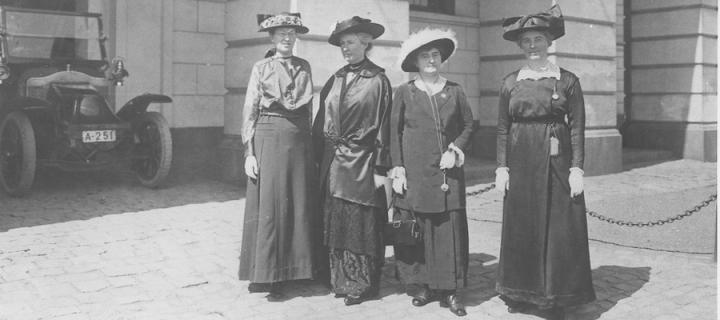Chrystal MacMillan (1872 - 1937)
The University's first female science graduate, but also a pioneering feminist and pacifist.

Born in Edinburgh in 1872 as the only daughter of nine children, Chrystal MacMillan was one of the first women to be admitted to a university course in Scotland.
A university pioneer
MacMillan then went on to achieve another first, as she became the first woman to graduate from Edinburgh in science, which she did with first class honours in mathematics and natural philosophy.
As well as her academic achievements, Chrystal was actively involved in student politics. She regularily chaired the Women’s Representative Committee, lobbied the Scottish University authorities on the subject of gender parity for scholarships and bursaries, and was Vice President of the Women's Debating Society.
Suffrage
After graduation, and despite a period back at the family home after the death of her father, Chrystal worked to create opportunities for young people in industry and was a prominent voice in the women's rights movement.
A focal point for her activism and work was a woman's right to vote. Between 1900 and 1913 she worked for the Scottish Federation of Women’s Suffrage Societies and campaigned throughout Scotland. She spoke at public meetings and encouraged women to find their own voices and to organise themselves locally.
The House of Lords
When female graduates were denied the right to vote on the MPs elected to represent the University, history was made yet again as Chrystal became the first woman to plead a case before the House of Lords.
Although the case was rejected, the publicity generated turned the matter into an international issue.
Active pacifism
As an increasingly well known figure and a key member of the International Women’s Suffrage Alliance, MacMillan used her status and influence to highlight the sufferings experienced by women and men in war.
She was one of the organisers of the International Congress of Women in The Hague in 1915, and was a member of the delegation from that Congress to present proposals to heads of neutral states for halting World War I.
Following the Armistice she was a delegate at the Paris Peace Conference, which was held in 1919.
[Chrystal was] an able politician who did not beat her head against the stone wall; rather she chiselled until the stone wall began to crumble.
Her legacy
After the war MacMillan felt that the most effective way to campaign for the causes she believed was to become a lawyer.
She was called to the bar in 1924 and became, what would now be termed, a human rights lawyer; thus helping to establish a professional field that now represents and protects the vunerable and disenfranchised.
A concrete reminder
She is also remembered by the School of Social and Political Science at the University, whose building in George Square was named in honour of Chrystal's dedication to peace and women’s rights, and as a symbol of the School’s interests in gender, international politics and human rights.

